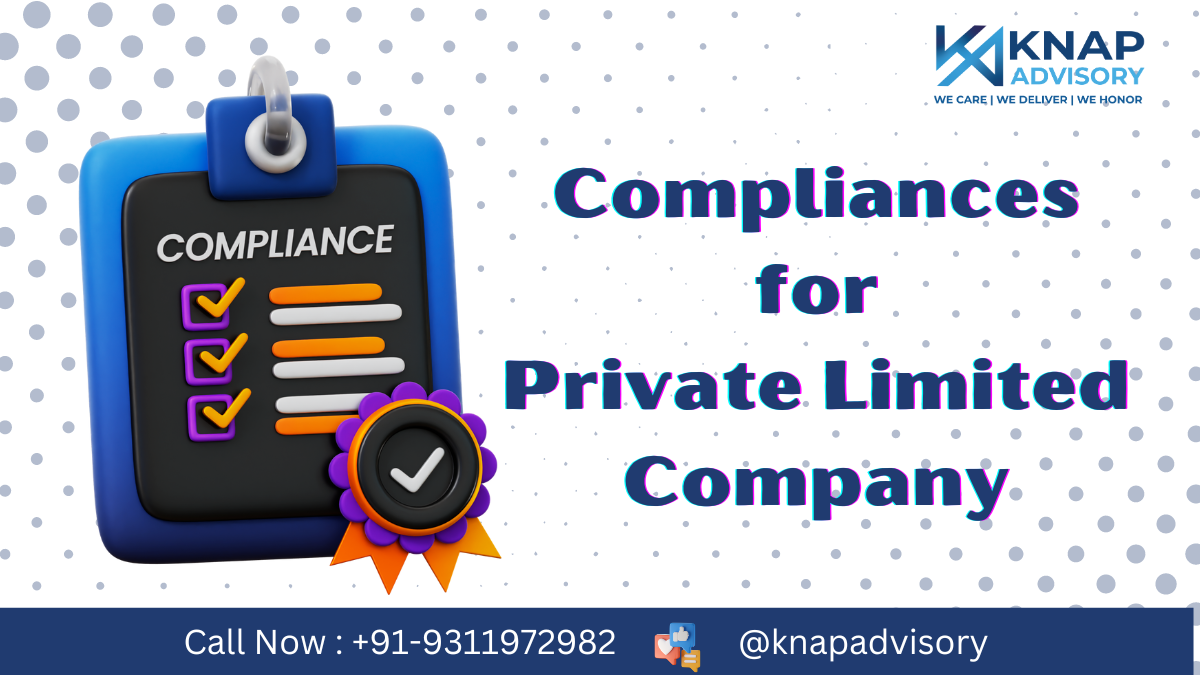


The role of Private Limited Companies (PLCs) in driving economic growth and development is crucial in today's ever-changing corporate landscape. But there are also significant obligations, particularly in the area of company compliance, that come along with excellent prospects. The long-term viability and conformity of a Private Limited Company depend on successfully navigating the intricate web of regulatory regulations. To aid company owners and stakeholders in comprehending, streamlining, and remaining in compliance with the regulatory environment, KNAP Advisory has dug deep into the complexities of compliances for Private Limited Companies in this blog.
It is critical to understand the basics of a Private Limited Company before exploring the particular compliances. Separate from its owners, a private limited company has limited liability and is considered an independent legal entity. It provides a plethora of benefits, including as restricted liability for shareholders, eternal existence, and ease of transferability. Nevertheless, these advantages are not without responsibilities that must be carefully considered to guarantee compliance with the law.
Starting with the incorporation process is the first step towards compliance. For a trouble-free launch, KNAP Advisory suggests being thorough. Among these steps include submitting formation paperwork to the Registrar of Companies (RoC), getting directors' Digital Signature Certificates (DSCs) and Director Identification Numbers (DINs), and approving names.
A Private Limited Company is required by law to have both annual and extraordinary general meetings. Shareholders are able to voice their opinions on important matters and make choices during these gatherings.
Once the company is officially formed, it has 180 days to make an application with the ROC to start doing business officially. This form can't be turned in until everyone who signed the memorandum has paid for their share capital.
One important need for compliance is the appointment of auditors and the filing of their reports with the RoC. To make sure accounting rules and standards are followed. In the 30 days after the company is formed, the board has to choose its first auditor.
Laws pertaining to the payment of income tax must be followed by private limited companies. To minimize tax obligations and maximize compliance with the Income Tax Act, KNAP Advisory suggests a thorough tax strategy.
A private limited company is required to register with the Goods and Services Tax (GST) system if its annual revenue is more than ₹ 40 Lakh in case of Goods or ₹ 20 Lakh in case of service. In order to be in line with GST legislation and file their taxes correctly, connect with our experts
Maintaining compliance requires regular filings with the RoC, such as yearly returns, changes to directors or registered office, and other filings triggered by events. To avoid penalties, KNAP Advisory stresses the need of being current with filing deadlines.
Paying employees their wages, contributing to their provident funds, and meeting all other legal obligations is of the utmost importance. KNAP Advisory suggests establishing strong HR procedures to guarantee adherence to labour laws.
Limited By Ownership In order to address and resolve critical business issues, companies are required to hold frequent board meetings. Keeping accurate recordings of board meetings is critical for proving compliance with corporate governance standards, according to KNAP Advisory.
Private limited companies must ensure they have strong processes in place for managing compliance and internal controls. In order to find and fix any compliance gaps, KNAP Advisory offers you its robust Internal Audit service.
Finally, Private Limited Companies need to be proactive and thorough when dealing with the regulatory environment. KNAP Advisory stresses the importance of keeping up with legislation changes, conducting audits on a regular basis, and continuously monitoring to guarantee compliance. In an increasingly regulated business climate, companies can achieve both their legal responsibilities and the groundwork for long-term success by implementing a holistic plan. Never forget that Private Limited Companies must comply with all applicable laws and regulations; doing so is also crucial to their success in the long run.

26 Nov, 2025

10 Sep, 2025


31 Aug, 2024

31 Aug, 2024

05 Apr, 2024

03 Jan, 2024

13 Dec, 2023

11 Dec, 2023

08 Dec, 2023

06 Dec, 2023

24 Feb, 2023
We have been especially crucial in ensuring startups are compliant with India's complex legal structure. We accept responsibility and obligation on behalf of the business owners and co-founders for adhering to all legal requirements. We strive to deliver a wide range of quick, effective, and compliance-focused services to any company or individual with a startup mentality. We are abide by our motto:- We Care, We Deliver, We Honor.